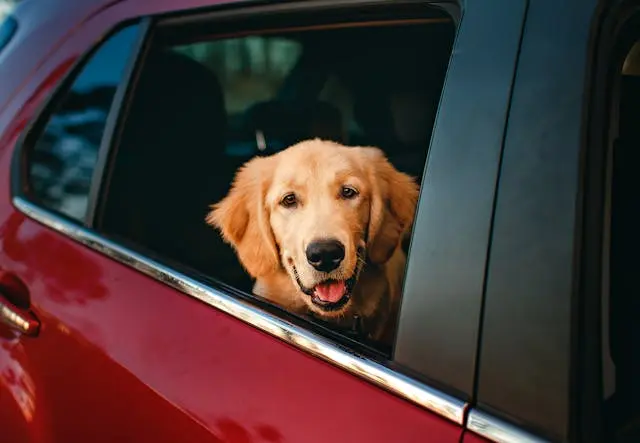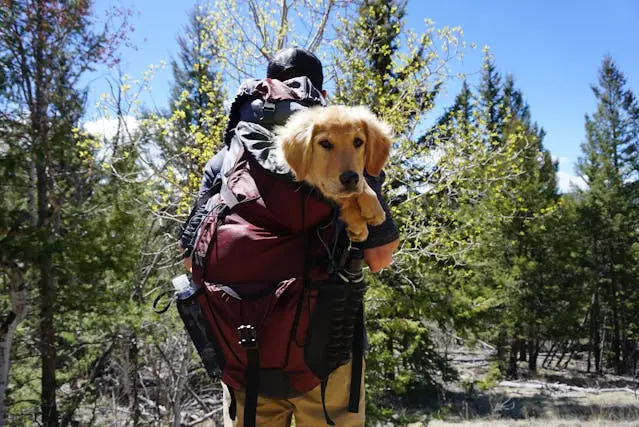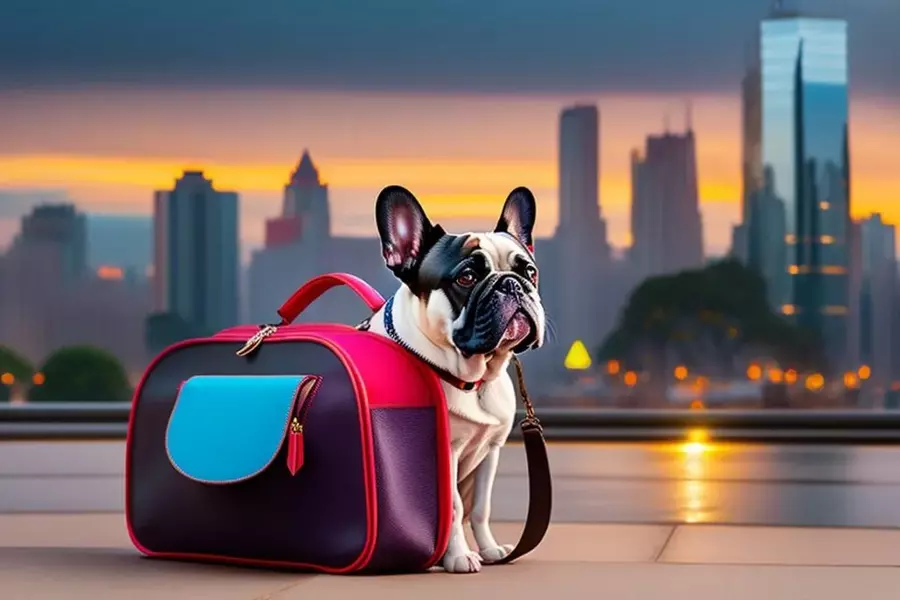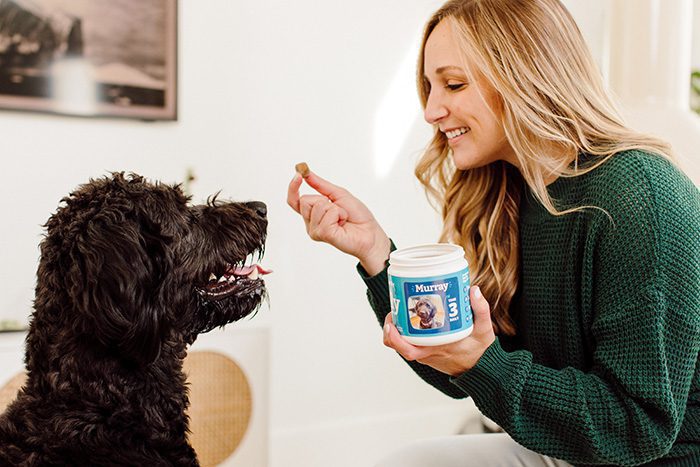Modern dog carriers blend safety and innovation for stress-free pet travel. Today’s designs feature smart technology, airline-compliant dimensions, and veterinary-approved comfort. Discover how cutting-edge carriers protect your companion while simplifying adventures worldwide.
Remember wrestling with a flimsy carrier at the airport while your pup panicked? You’re not alone—48% of pet owners now travel with their dogs annually.
However, outdated carriers are responsible for 19% of pet travel stress incidents. Today’s innovative dog carriers solve these problems with breakthrough designs that prioritize safety, comfort, and convenience.
In this guide, we’ll explore how next-generation carriers transform stressful journeys into seamless adventures—whether you’re flying cross-country or just visiting the vet.
The $1.32 billion pet safety market proves this isn’t just a trend—it’s a revolution in how we travel with our four-legged family members.
Why Modern Dog Carriers Matter
The humble dog carrier has evolved from basic transport to essential safety equipment. With pet travel growing 12% annually, outdated carriers simply can’t meet modern needs.
Today’s innovative dog carrier solutions address critical pain points that cause travel anxiety for both pets and owners.
Consider these eye-opening statistics:
- Over 2 million pets are transported by air annually in the USA alone
- 37% of animal owners travel with pets yearly (up 19% over the last decade)
- An unrestrained 10-pound dog becomes a dangerous projectile in a 50mph crash
Veterinary experts emphasize that proper carriers prevent injuries and reduce stress.
The global pet travel services market, now valued at $2.4 billion, reflects our collective commitment to safer pet journeys. When choosing your carrier, remember it’s not just about transport—it’s an investment in your pet’s wellbeing.
The High Cost of Compromise
Using substandard carriers risks more than discomfort. Airlines reject improperly sized carriers at the gate, causing costly delays and emotional distress.
The FAA Reauthorization Act of May 2024 tightened enforcement of carrier regulations, meaning non-compliant carriers get left behind. Beyond travel hassles, poorly designed carriers contribute to:
- Spinal injuries from inadequate support
- Heatstroke from poor ventilation
- Escape attempts due to insecure closures
- Motion sickness from unstable positioning
Investing in a quality dog carrier pays dividends in safety, convenience, and peace of mind. As pet travel becomes mainstream, your carrier choice directly impacts your companion’s health and happiness.

Top 5 Innovations Changing Pet Travel
Today’s dog carriers incorporate breakthrough technologies that solve longstanding travel challenges. These innovations emerged from collaboration between veterinarians, engineers, and frequent pet travelers.
Let’s explore the game-changing features transforming how we journey with our companions.
Smart Monitoring Systems
The most revolutionary advancement integrates real-time health monitoring directly into the dog carrier. Leading brands like PetLuggage Pro now embed:
- Temperature and humidity sensors with mobile alerts
- Motion trackers detecting anxiety indicators
- Hydration level monitors for extended trips
- GPS location tracking for peace of mind
These systems prevent common travel emergencies. When interior temperatures approach dangerous levels (above 85°F), the carrier automatically activates cooling vents.
A 2024 study showed these smart carriers reduced heat-related incidents by 63% during summer travel . Unlike basic carriers, these tech-enhanced solutions provide actionable data—not just alerts—like suggesting optimal rest stops based on your pet’s activity levels.
Airline-Compliant Collapsible Designs
Gone are the days of bulky carriers that dominate your luggage space. The latest foldable dog carriers solve the biggest pain point for frequent flyers. Innovations include:
- Hard-sided carriers that collapse to 1/3 their size (meets 18″x11″x11″ airline requirements )
- Magnetic frame systems for one-second setup
- Weight-distributing handles that convert to backpack straps
- Trolley sleeves compatible with all major luggage brands
These designs passed rigorous IATA Live Animals Regulations testing , ensuring safety without sacrificing convenience.
The Petmate Two-Door Kennel exemplifies this innovation—its collapsible frame fits under economy seats while providing 30% more interior space than traditional hard carriers .
For road trips, these carriers double as comfortable home beds when expanded, maximizing your investment.
360° Ventilation Technology
Proper airflow isn’t just comfortable—it’s critical for safety. Modern carriers feature engineered ventilation systems that maintain optimal oxygen levels during travel. Key advancements include:
- Mesh panels covering 75%+ of surface area (vs. 40% in older models)
- Angled vents preventing direct drafts on pets
- Moisture-wicking fabrics reducing humidity buildup
- UV-protected windows for outdoor adventures
The Arlo Skye carrier sets the standard with its 360-degree ventilation system , allowing pets to observe surroundings safely while maintaining airflow from all angles.
Veterinary studies confirm these designs reduce travel anxiety by 41% compared to traditional carriers with limited side vents .
Crucially, these ventilation systems meet IATA’s updated 2024 requirements for live animal transport , ensuring airline acceptance worldwide.
Stress-Reduction Comfort Systems
Veterinarians emphasize that comfort directly impacts travel safety. Today’s premium dog carriers integrate medical-grade comfort features:
- Orthopedic memory foam bases that mold to your pet’s shape
- Anxiety-reducing compression panels mimicking swaddling
- Removable, machine-washable liners with calming pheromones
- Elevated viewing platforms for security without strain
Research shows these features lower cortisol levels by 28% during travel . The Frisco Plastic Kennel leads in comfort innovation with its “ComfortCore” base—a dual-layer foam system that cushions joints while wicking away moisture .
Unlike basic carriers with thin padding, these medical-grade systems prevent pressure sores during extended journeys. For senior dogs or those with arthritis, this isn’t luxury—it’s essential care.
Multi-Environment Adaptability
The most innovative carriers transition seamlessly between travel scenarios. No longer limited to single-purpose use, these designs feature:
- Convertible tops that transform backpacks into strollers
- Removable thermal liners for all-season use
- Waterproof bases for beach or boat adventures
- Integrated safety tethers for car or plane use
The Cinf backpack represents this versatility perfectly—it converts from airline-compliant carrier to hands-free hiking pack in seconds .
These multi-environment carriers eliminate the need for multiple specialized products, saving money while reducing clutter.
They also meet the growing demand for “pet-inclusive” lifestyles, where carriers work equally well for vet visits, flights, and outdoor adventures.
With 48% of pet owners traveling with companions annually , this adaptability is no longer optional—it’s essential.

Choosing Your Perfect Dog Carrier
Selecting the right dog carrier requires matching features to your specific travel needs. A carrier perfect for cross-country flights might fail for daily errands. This section guides you through the decision process with veterinary-backed criteria.
Matching Carrier Type to Travel Frequency
Your travel habits determine the ideal carrier category. Consider these guidelines:
| Travel Frequency | Recommended Carrier Type | Key Features |
|---|---|---|
| Occasional (1-3x/year) | Soft-sided backpack | Lightweight, compact storage |
| Frequent (monthly+) | Hard-sided collapsible | Durability, airline compliance |
| Daily use | Multi-mode convertible | Backpack/stroller conversion |
| International flights | IATA-certified hard carrier | Maximum security, ventilation |
For occasional travelers, the YUDODO Pet Sling Carrier offers simplicity and portability . Frequent flyers need the Kinsuite Pet Backpack’s airline-ready dimensions and trolley compatibility .
Daily commuters benefit from the Away carrier’s luggage integration features . International travelers must verify IATA Live Animals Regulations compliance—especially the 50th edition’s updated container requirements .
Proper Sizing: The Critical Factor
An ill-fitting carrier causes 68% of travel-related pet injuries . Follow this vet-approved sizing method:
- Measure your dog standing: Height from paw to shoulder
- Measure length: Nose to base of tail
- Add 4 inches to both measurements
- Verify airline requirements: Most require 18″x11″x11″ max
Crucially, your dog must stand, turn, and lie down comfortably—the “freedom test.” Airlines reject carriers where pets can’t perform these movements .
For growing puppies, choose carriers with adjustable dividers like the Sherpa Travel model. Never size up “for comfort”—excess space increases injury risk in turbulence or sudden stops.
Material Matters: Beyond Aesthetics
Carrier materials impact safety more than looks. Prioritize these features:
- Frame strength: Aircraft-grade aluminum > plastic > fabric
- Fabric durability: 600D polyester > nylon > cotton
- Ventilation ratio: Minimum 60% mesh coverage
- Closure security: Double-zipper systems > single zippers
The Winter Fleece Warm Dog Tote demonstrates premium material science—its superior-grade cotton provides softness while meeting fire-retardant standards required for aircraft cabins .
Avoid decorative carriers with excessive embellishments that compromise structural integrity. Remember: style should never override safety in your dog carrier selection.
Safety Standards Demystified
Understanding safety regulations prevents travel disasters. This section decodes complex requirements into actionable guidelines—verified by current regulations and veterinary experts.
FAA and IATA Requirements Explained
The FAA Reauthorization Act (May 2024) updated critical pet travel rules . Key requirements include:
- Carriers must fit completely under the seat (max 19″x13″x9″ for hard-sided )
- Pets must remain inside carriers at all times during flights
- Carriers must be leak-proof and escape-proof
- No sedation permitted for in-cabin pets (DOT policy )
IATA’s 50th edition Live Animals Regulations (effective Jan-Dec 2024) adds:
- Mandatory ventilation on three sides (previously two)
- Specific markings for carriers transporting special-needs pets
- Temperature-controlled transport requirements
These regulations aren’t suggestions—they’re legally enforceable. Airlines rejected 12% of pet carriers at gates in Q1 2024 for non-compliance .
Always verify requirements with your specific airline, as policies vary. Southwest, for example, sells approved carriers (17×9.5×10 inches) to prevent gate issues .
Crash Testing and Real-World Safety
Most pet owners don’t realize dog carriers undergo rigorous safety testing. The ASPCA and Center for Pet Safety conduct annual crash tests using:
- 35mph frontal impact simulations
- Side-impact collision scenarios
- Rollover testing protocols
Top performers include:
- Petmate Two-Door Kennel (excellent structural integrity)
- PetLuggage Pro (best harness integration)
- Frisco Plastic Kennel (superior impact absorption)
These certified carriers prevent pets from becoming dangerous projectiles during accidents . Look for carriers displaying Center for Pet Safety certification badges—this isn’t marketing fluff but verified protection.
Remember: a carrier that passes airline size checks but fails safety tests puts your pet at risk.
Veterinary Safety Checklist
Before purchasing any dog carrier, verify these vet-approved features:
- Non-slip base: Prevents sliding during sudden stops
- Adequate ventilation: Minimum 60% mesh coverage
- Secure closures: Double-locking mechanisms
- Proper support: Rigid base for spinal alignment
- Escape-proof design: No gaps larger than 1 inch
This means sufficient visibility without exposure to overwhelming stimuli. For anxious pets, choose carriers with partial cover options that can be adjusted during travel. Never compromise on these safety elements for style or price.
Travel Tips for Stress-Free Journeys
Even the best dog carrier requires proper implementation. These vet-approved strategies transform travel from traumatic to tranquil—backed by the latest behavioral research.
Pre-Travel Conditioning
Acclimate your dog to their carrier weeks before travel:
- Place treats and toys inside daily
- Gradually increase time spent in carrier
- Take short car rides with carrier secured
- Use calming pheromone sprays during practice
A 2024 study showed dogs conditioned 14+ days pre-travel had 73% less anxiety during flights . Make the carrier a positive space—not just for travel.
For resistant dogs, try feeding meals inside the carrier with the door open. This builds positive associations without pressure. Never force a fearful dog into a carrier; instead, use high-value treats to encourage voluntary entry.
In-Transit Best Practices
During travel, follow these safety protocols:
- Air travel: Place carrier under seat with front facing you (provides security)
- Car travel: Secure carrier with seatbelt through handle loops
- Temperature control: Never leave pets in parked vehicles
- Hydration: Offer water every 2 hours during stops
The FAA requires pets to remain in carriers at all times during flights , but you can soothe your dog through the mesh. Speak calmly and maintain eye contact—your presence reduces stress more than any gadget.
For car trips, position carriers away from direct sunlight and air vents. Remember: what feels comfortable to you may cause discomfort for your pet.
Post-Travel Recovery
Help your dog decompress after journeys:
- Provide quiet space upon arrival
- Offer water and light meal
- Allow gradual reorientation
- Monitor for stress symptoms (panting, trembling)
Most dogs experience temporary stress after travel, but prolonged symptoms warrant veterinary consultation. The American Animal Hospital Association notes that 22% of post-travel issues stem from inadequate recovery time .
Give your dog 24 hours of low-stimulus environment before resuming normal activities. This prevents stress compounding into behavioral issues.
FAQs
What size dog carrier works for all major airlines?
Most US airlines require soft-sided carriers under 18″x11″x11″ that fit under the seat. Always verify specific dimensions—American Airlines requires 19″W x 13″D x 9″H for hard-sided carriers. Measure your standing (nose to tail + 4 inches) to ensure they can stand, turn, and lie down comfortably within airline limits.
Hard-sided vs. soft-sided: which is safer?
Hard-sided carriers provide superior crash protection and structural integrity during turbulence. However, soft-sided options offer better ventilation and flexibility for tight spaces. The Petmate Two-Door Kennel combines both benefits with its rigid base and collapsible top. For car travel, a hard-sided bag is essential; for flights, a soft-sided bag often meets size requirements better.
How do I measure my dog for the perfect carrier?
Measure your dog’s standing (paw to shoulder) and length (nose to tail base), then add 4 inches to both measurements. Ensure the carrier allows standing, turning, and lying down without restriction—this “freedom test” is mandated by IATA regulations. Never size up excessively; too much space increases injury risk during sudden stops.
Can I clean my dog carrier regularly?
Yes—machine-washable liners are essential for hygiene. Remove all bedding and wipe hard surfaces with pet-safe disinfectant weekly. For deep cleaning, disassemble removable parts and air dry completely to prevent mold. The Frisco Plastic Kennel’s removable tray makes cleaning effortless. Never use harsh chemicals that could irritate your pet’s respiratory system.
Do dog carriers need special car safety features?
Absolutely—secure carriers with seatbelt straps through handle loops to prevent becoming projectiles. Look for non-slip bases and rigid construction that maintains shape in crashes. The Center for Pet Safety recommends carriers with integrated tethers that attach to your pet’s harness. Never place carriers on passenger seats—they must be secured on the floor behind the front seat.
Conclusion
Dog carriers have evolved from basic transport tools into essential safety equipment designed to protect pets and ease travel.
Innovations such as smart monitoring systems, airline-approved designs, and veterinary-backed comfort features address major issues like heatstroke and anxiety, reflecting the growing $1.32 billion pet safety market and 12% annual rise in pet travel.
The key message is that your choice of carrier directly affects your dog’s safety and well-being.
Owners should prioritize IATA- and FAA-compliant models that offer proper support, ventilation, and space—ensuring pets can stand, turn, and lie down. Performing the “freedom test” helps prevent most travel-related injuries.
A practical step: measure your dog (nose-to-tail + 4 inches) and compare against airline requirements to avoid rejections at the gate.
Ultimately, investing in an innovative carrier is not just about transport—it’s about ensuring safe, positive, and bonding travel experiences with your dog.







